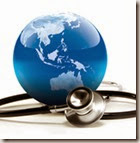 An expat’s biggest risk is ill health. Most of the inconveniences, from visas to language, can be solved with time, money, and persistence. But a bout of sickness or an accident requiring hospitalization can precipitate a real crisis. Do you know how the health care system works and how to access care should you need it? Will anyone realize that you’ve been injured; can anyone help during your convalescence?
An expat’s biggest risk is ill health. Most of the inconveniences, from visas to language, can be solved with time, money, and persistence. But a bout of sickness or an accident requiring hospitalization can precipitate a real crisis. Do you know how the health care system works and how to access care should you need it? Will anyone realize that you’ve been injured; can anyone help during your convalescence?
Equally worrisome is the other side of the coin: if something were to happen to someone at home, how would you know and how could you help?
The healthcare needs of expats are growing quickly. A recent survey reports:
There are over 50 million expatriates, and by 2020 this will be 60 million. 232 million people now live away from their country of birth. Between one in two and one in three expatriates has no international health insurance, although a minority is covered by domestic health insurance. Several countries seek to get expatriates and migrants to pay for healthcare or have compulsory health insurance.
The Boy Scouts have it right: Be Prepared.
Its important to think through the scenarios, put sensible measures in place. Then you will have the processes, resources, and contingencies available should you ever have to rely on them.
‘A few thoughts from my experiences that may point you in the right direction (expathealth.org also offers relevant news and many practical tips):
1. Stay Healthy.
Eat healthy, get exercise and sleep, keep life bounded and in balance. Avoid unsafe situations or foods, get an annual checkup and keep vaccinations current. In short, stay ahead of problems before they grow into emergencies.
Expat life is inherently stressful, and good mental health practices are also important to consider and maintain.
2. Use the Buddy System.
I live independently, social and connected but not particularly stationary or scheduled. If there were an emergency, it could be days before I was missed.
Make sure that you stay c0onnected0 with someone who cares, and make it a daily habit to keep in touch about your plans, progress, and affect. I use location-aware time-stamped messaging to send short updates to a key contact throughout the day: “Leaving on train from Amsterdam”, “Joining Robert for dinner”, “Made it home”.
3. Register with a primary care clinic, then use it a few times.
Health care is good in Europe, but its organized, accessed, and paid for differently from place to place. In the Netherlands and UK, patients access care through primary care physicians who you register with and who maintain my records and billing numbers. If you have a minor complaint or illness, use the walk-in once or twice to get the hang of the system: when the walk-in hours are, how to fill a prescription, and how to access secondary providers like vision and dental clinics. of course, know where the nearest hospital is located and the emergency services number (112 in Europe).
4. Check your coverage.
It can be a surprise to learn that expensive US health plans don’t cover lengthy overseas stays. You may further need to pay for care yourself, then be reimbursed by your insurer. I found that my life and disability insurance had exclusions in some countries. I found that plans can be extended with notification or a small rider for wider geographic coverage.
A local insurance plan (mandatory in the Netherlands) may be the best option. But even then, you may need a further supplement for holiday travel.
If you need hospitalization or specialized treatment, allow enough time to set up a care plan and coverage. I needed a long negotiation to secure coverage (in writing) and a referral from a US physician for a foot surgery. Fortunately, the negotiated plan also covered temporary housing near the clinic and some transportation costs, which helped out a lot.
5. Enable location tracking.
Make sure that someone can determine where you are. Phones and tablets are GPS-Aware, and periodic location information can be stored or sent with a variety of apps. Its reassuring to everyone if they can put a finger on where you are if you are long-overdue.
6. Stock your meds
Available over-the-counter meds and supplements vary widely from country to country, and remedies that you customarily rely on may not be available locally. I keep some cold meds, throat lozenges, melatonin, low-dose aspirin, and a 60-day supply of prescription meds (eg: Lipitor) on hand, and help other expats replenish their cabinet when I visit the US.
7. Carry a notification ID.
This can range from a simple laminated printout to a full blown Medical ID bracelet or dogtag. My card has my name, age, allergies, and emergency contacts: expanded information could include nationality, physician contacts, and chronic conditions or devices (eg: a pacemaker).
8. Know how to evac.
In a serious situation, facing extended hospitalization or rehabilitative treatments, you may need to go back to your home country. Evacuation insurance can be useful: a friend suffered appendicitis and needed emergency surgery. It progressed to a serious abdominal infection, immobilizing him in Italy. His US plan paid for a consult and progression to a flight back when his condition stabilized. He had many months convalescence before he was fully recovered, but could have been pinned down alone in Europe without the cover.





